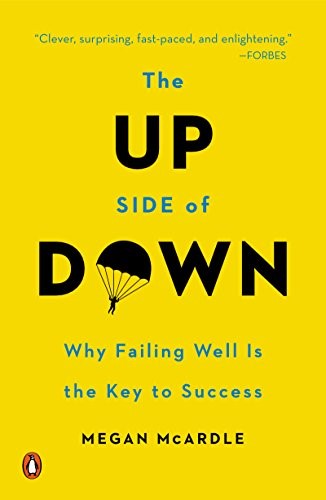Get Career Ready
Be prepared for opportunities you didn't anticipate: Get career ready today!
Career Transitions
Transitioning to a new career or coming back after a gap can be fun, rewarding and easier than you think.
Brand You
Polish your personal brand, it is your largest asset and will be with you throughout your career.
How Failure Makes Us Stronger!

Failure is tough on all of us. Whether a missed shot to win the game, a bad grade, or unrequited love, failure triggers emotions like sadness, fear, and anxiety that we generally wish to avoid in life. This impacts how often we start businesses (though it’s getting better), pursue more job responsibilities, and even how we advise/raise children.
However, in seeking to avoid failure, we all risk curtailing our successes as well. Wayne Gretzky once said, “You miss 100 percent of the shots you never take.” What is true in hockey is also true in life. Many people we work with remain wary of failure (we're sometimes scared of it too), leading some to pivot to their backup plans (e.g., returning to their pre-MBA industries) before fully pursuing their goals. While doing so might protect you in the short term, the long-term costs of opportunities lost are immeasurable. Perhaps you could have launched your software idea and gotten funded. Or scaled your existing restaurant business nationwide. Or established your African VC firm. Why not take some risks, especially when you're young?
To overcome fear of failure, try the following:
1) Redefine Failure to You
Professor McGrath at Columbia has great advice on better ways to fail. In particular, she suggests you define what success looks like.
During a recent corporate training course, multiple teams were created to assemble prosthetic limbs for charity. As part of the exercise, teams competed with each other for how many prosthetics could be assembled that met the required quality standards. During the judging, a member of one of the teams became upset, worried his contributions had been overlooked. Even after learning his team had won, he persisted in highlighting his “overlooked” contributions, rather than the team’s success. What should have been a team celebration turned into an argument, all because success hadn’t been properly defined.
On the other hand, sports teams who rally to win often offer a formula for redefining success. You often hear “one play at a time” as a cliché, especially when that team has rallied to win. It speaks to creating successes in each play, rather than focusing on the overall outcome of the game (which at times can seem overwhelming). Doing so can create more opportunities for success, build confidence, and in competitive situations cause your competition to divert from their winning strategies.
2) Focus on What You Will Learn
Our friend and author Megan McArdle, in The Up Side of Down, highlights several of her own failures that enabled her subsequent successes. She discusses how, through layoffs, employers’ bankruptcies, and a risky transition, after graduating from one of the world's best business schools, to an uncertain future as an author and c ommentator, she used the stress and lessons learned along the way to achieve success at Bloomberg. Further, she talks about the larger ramifications of learning from one’s failures. From kindergartners outperforming engineers on design tests due to embracing iteration and experimentation, to stories of entrepreneurs only discovering their business models when threatened with bankruptcy, failure is often an important trigger for future success. In fact, Warren Buffett highlighted how his failure to get into Harvard “was the best thing that ever happened.”
ommentator, she used the stress and lessons learned along the way to achieve success at Bloomberg. Further, she talks about the larger ramifications of learning from one’s failures. From kindergartners outperforming engineers on design tests due to embracing iteration and experimentation, to stories of entrepreneurs only discovering their business models when threatened with bankruptcy, failure is often an important trigger for future success. In fact, Warren Buffett highlighted how his failure to get into Harvard “was the best thing that ever happened.”
 ommentator, she used the stress and lessons learned along the way to achieve success at Bloomberg. Further, she talks about the larger ramifications of learning from one’s failures. From kindergartners outperforming engineers on design tests due to embracing iteration and experimentation, to stories of entrepreneurs only discovering their business models when threatened with bankruptcy, failure is often an important trigger for future success. In fact, Warren Buffett highlighted how his failure to get into Harvard “was the best thing that ever happened.”
ommentator, she used the stress and lessons learned along the way to achieve success at Bloomberg. Further, she talks about the larger ramifications of learning from one’s failures. From kindergartners outperforming engineers on design tests due to embracing iteration and experimentation, to stories of entrepreneurs only discovering their business models when threatened with bankruptcy, failure is often an important trigger for future success. In fact, Warren Buffett highlighted how his failure to get into Harvard “was the best thing that ever happened.”One of our favorite stories from our client work relates to someone who decided to discuss his alcoholism when applying to business school. This had impacted him deeply; he had lost his job (and impacted his broader employability given the tight-knit nature of his industry), lost friends, and damaged his health. After achieving his sobriety goals, he decided to apply to MBA programs. He struggled with how open to be with Admissions Committees. It was unlikely they would find out, and he had other great accomplishments to discuss in his essays. We spent many hours discussing how to address it, including whether to address it at all. However, learning from this particular failure was a key turning point in his life. So instead of trying to hide from his past, he focused on explaining how hitting rock bottom had enabled success at a new employer, and how it prepared him for any rigors he might face at business school and afterwards. His essays included raw details, and made him vulnerable. However, he ended up attending one of his top 3 MBA choices!
3) Share Stories
Early into our launch of ProValues, we were demonstrating it in front of a potential enterprise customer, and it crashed. We were mortified; it was our biggest prospect for our newest tool, and suddenly it just wasn't working. This had never happened before. While admittedly a bit panicked, we clarified our goal (get the tool working again…now!) and focused on that above anything else (such as preventing future crashes). Through that focus, we were able to fix the problem in under a day, and more importantly show our potential customer how our organization acted unscripted, under pressure. Then through our post-mortem afterwards, we identified the gap in our code and closed it. In the end, our initial "failure" of a demo led to success that exceeded our initial expectations, and has led to many more adopters. Failure had made us stronger.
We share that story not because it makes us look good or bad, but because it has triggered so many other conversations we have had with clients, business partners, and our own employees. The world sometimes prompts us to think and act like everything should be perfect all the time. It never is. Sharing stories of your own failures, and more importantly what you learned from them, will help you realize you’re not alone, and will help you build bridges with others who may have shared similar experiences and learned different lessons.
Tags:
